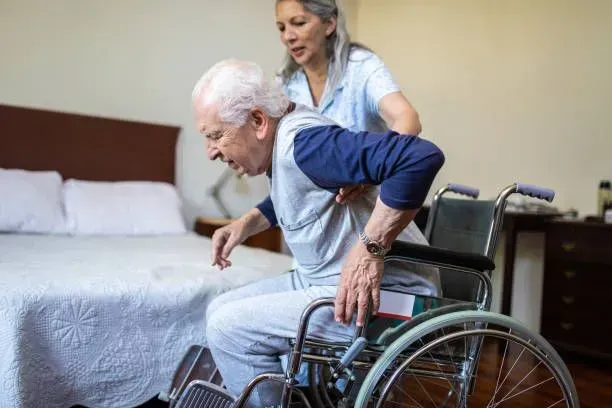Understanding Bed Sores: Causes, Stages, and Early Detection
The Agency for Healthcare Research and Quality reports"each year, more than 2.5 million people in the United States develop pressure ulcers. These skin lesions bring pain, associated risk for serious infection, and increased health care utilization."

Bed sores, also known as pressure ulcers or decubitus ulcers, are a significant concern for individuals with limited mobility. These painful sores can develop when pressure is applied to the skin for an extended period, leading to damage in the underlying tissues. In this article, we will explore the causes, stages, and early detection of bed sores, shedding light on the importance of proactive care.
Causes of Bed Sores
Pressure: Bed sores are primarily caused by prolonged pressure on specific areas of the body, where the blood flow is restricted. This often occurs in individuals who are bedridden or have difficulty changing positions. Prolonged pressure, a key contributor to the development of bed sores, arises from the immobility of individuals confined to a bed or wheelchair. When pressure is consistently exerted on specific body areas—commonly the heels, hips, tailbone, and elbows—blood flow to the skin is compromised. This reduced blood circulation deprives the affected skin of essential nutrients and oxygen, leading to tissue damage over time. The lack of movement prevents the natural distribution of pressure, making these areas particularly vulnerable. Individuals who are unable to change positions frequently, whether due to illness, injury, or frailty, are at a heightened risk. Recognizing the significance of addressing this fundamental cause is paramount in preventing the onset of bed sores and underscores the importance of regular repositioning and specialized support surfaces.
Friction: Friction, another significant factor contributing to the formation of bed sores, occurs when the skin rubs against bedding, clothing, or other surfaces. This friction can exacerbate the vulnerability of the skin, especially during repositioning or transfers. Individuals with limited mobility are particularly susceptible to friction-related injuries, as the sheer force generated during these movements can lead to skin abrasions and breakdown. Caregivers and healthcare professionals play a crucial role in minimizing friction by employing gentle handling techniques, using appropriate lifting and transferring aids, and ensuring that bedding and clothing are smooth and free from wrinkles. Attention to these details is paramount in preventing the development of bed sores and maintaining the skin's integrity.
Moisture: Excessive moisture, a notable precursor to bed sores, significantly heightens the risk of skin breakdown, particularly in individuals with limited mobility. Perspiration, urinary or fecal incontinence, and inadequate skin care can create an environment conducive to skin damage. Moisture softens the skin, making it more susceptible to friction and increasing the likelihood of maceration, where the skin becomes oversaturated and breaks down. Incontinence, if not managed promptly and effectively, can compound the problem, as the acidic nature of urine and feces further weakens the skin's protective barrier. Proper hygiene practices, including regular cleansing and thorough drying of the skin, are essential in preventing moisture-related bed sores.
Poor Nutrition: Poor nutrition is a critical factor contributing to the development and exacerbation of bed sores. The skin's ability to resist damage and promote healing relies heavily on adequate nutrient intake, including proteins, vitamins, and minerals. Malnutrition weakens the overall integrity of the skin, making it more susceptible to breakdown even under mild pressure. Essential nutrients play a pivotal role in supporting tissue repair and maintaining the skin's elasticity. Individuals with inadequate nutrition may experience delayed wound healing, hindering the body's ability to recover from the cellular damage associated with bed sores.
Stages of Bed Sores
Bed sores progress through different stages, each characterized by varying degrees of tissue damage. Understanding these stages is vital for effective prevention and treatment.
Stage 1: In the initial stage, the skin appears red and may feel warm to the touch. It is often accompanied by pain or discomfort. At this point, the damage is superficial and may be reversible with prompt intervention.
Stage 2: The skin now shows signs of blistering or an open sore. The damage extends into the dermis, and infection becomes a concern. Proper wound care is crucial to prevent further complications.
Stage 3: At this stage, the wound deepens, reaching the subcutaneous tissue. The risk of infection intensifies, and medical attention is imperative. Treatment may involve advanced wound care and, in severe cases, surgery.
Stage 4: The most severe stage involves extensive damage, reaching muscles, tendons, or even bone. Infections are highly likely, and the risk of complications such as sepsis increases. Intensive medical care is essential.
The risks associated with developing bed sores are multifaceted and can have severe consequences for individuals with limited mobility or underlying health issues. Prolonged pressure on specific areas of the body, coupled with factors like friction, moisture, and poor nutrition, increases the vulnerability to bed sores. Left unaddressed, these pressure ulcers can progress through various stages, leading to deep tissue damage, infections, and, in extreme cases, exposing muscles or bones. Beyond the physical pain and discomfort, bed sores pose a significant risk of complications such as cellulitis, sepsis, and delayed wound healing, which can have serious implications for overall health. The financial burden associated with extended hospital stays for advanced wound care and potential surgical interventions further underscores the importance of proactive measures in preventing bed sores.
Early Detection and Prevention
Regular Skin Checks: Routine skin assessments are crucial, especially for individuals with limited mobility. Look for signs of redness, discoloration, or changes in skin texture.
Position Changes: Encourage frequent changes in position to alleviate pressure on vulnerable areas. This is particularly important for those confined to a bed or wheelchair.
Support Surfaces: Invest in pressure-relieving mattresses and cushions. These specialized surfaces help distribute pressure evenly, reducing the risk of bed sores.
Hygiene and Nutrition: Maintain good hygiene practices to keep the skin clean and dry. Additionally, ensure a well-balanced diet rich in nutrients to support overall skin health.
For caregivers, the prevention and early detection of bed sores are of paramount importance as they directly impact the quality of life and well-being of their care recipients. Bed sores can escalate rapidly, leading to pain, prolonged suffering, and a decline in overall health. Caregivers play a pivotal role in implementing preventive measures such as regular repositioning, managing moisture, ensuring proper nutrition, and maintaining vigilant skin assessments. Timely detection of early-stage bed sores is equally critical, as prompt intervention can prevent progression to more severe and complex conditions, reducing the risk of complications and the need for intensive medical interventions. Caregivers must be attentive to changes in the skin, collaborate with healthcare professionals, and provide compassionate, personalized care. At 7 Day Home Care, we recognize the significance of proactive bed sore prevention and detection, incorporating these measures into our home health aide services in Queens, Manhattan, Brooklyn, Nassau County, and Suffolk County, New York, to ensure the well-being and comfort of those under our care.
Effectively healing bed sores requires a comprehensive approach that addresses both the underlying causes and the specific needs of the affected individual. The first step is to relieve pressure on the affected area by using specialized support surfaces like pressure-relieving mattresses and cushions. Proper wound care is crucial, involving regular cleaning with mild solutions, application of appropriate dressings, and, in some cases, advanced therapies like negative pressure wound therapy. Optimal nutrition plays a pivotal role, as a well-balanced diet rich in protein, vitamins, and minerals supports tissue repair. Collaborating with healthcare professionals, including wound care specialists, is essential to tailor a treatment plan based on the severity of the bed sore. Additionally, maintaining meticulous hygiene practices, managing moisture, and promoting overall skin health contribute significantly to the healing process.
The information provided in this article is intended for general informational purposes only and should not be construed as professional medical advice. It is not a substitute for consultation with qualified healthcare professionals. Individual circumstances vary, and specific medical conditions may require tailored interventions. Readers are encouraged to seek the advice of healthcare professionals for personalized guidance on prevention, detection, and treatment of bed sores or any other health-related concerns.
Bed sores pose a significant threat to individuals with limited mobility, but with proactive measures and early detection, their impact can be minimized. It is crucial for caregivers and healthcare professionals to work together in providing comprehensive care to prevent the development and progression of bed sores. At 7 Day Home Care, we understand the importance of attentive home health aide services in Queens, Manhattan, Brooklyn, Nassau County, and Suffolk County, New York, ensuring that individuals receive the care they need to maintain optimal skin health and overall well-being. Contact 7 Day Home Care today at 516-408-0034 to learn more about our Home Health Aide in-home care services throughout NYC and Long Island, New York.
Brian Callahan
7 Day Home Care


Living With Parkinson’s Disease: How In-Home Care Helps Seniors Stay Safe, Independent & Comfortable








